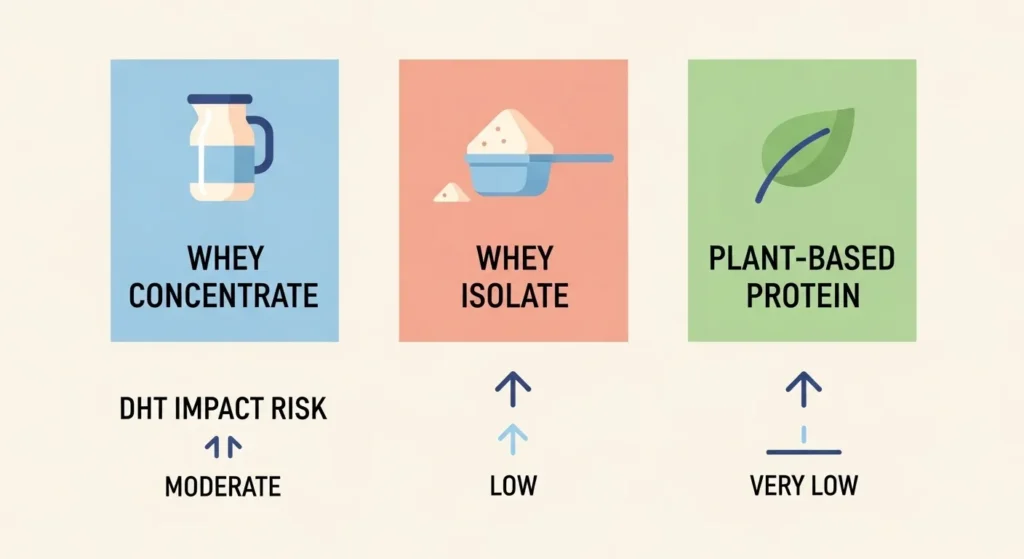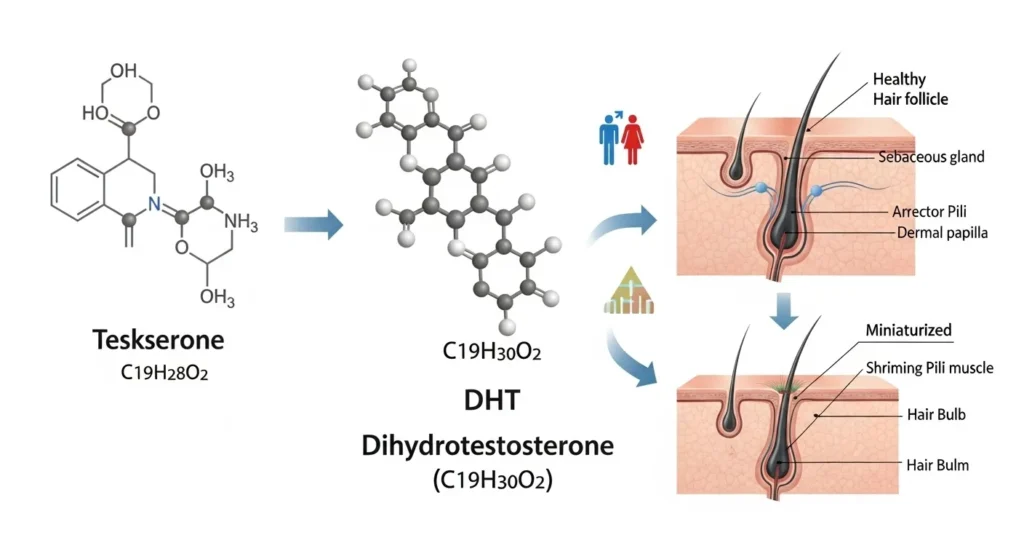You’ve started noticing more hair in the shower drain and can’t help but wonder: Does protein supplement cause hair loss?
This article breaks down the science, expert insights, and real-life stories to uncover the truth. You’ll learn how different protein types affect your hair, what research says, and how to protect your locks without compromising your fitness goals.
Backed by medical knowledge and practical advice, this guide gives you the clarity and confidence you need.
What Types of Protein Supplements Are Common?

Protein supplements come in several forms, and their composition matters when discussing potential hair effects.
Whey Protein Isolate vs Concentrate
- Whey Concentrate: Contains protein along with small amounts of carbs and fats, less processed.
- Whey Isolate: Highly processed to remove most lactose and fat, leaving almost pure protein. Some suggest that isolation may have a stronger impact on hormonal pathways, but evidence is limited.
- Why it matters: If hair shedding coincides with starting an isolate, a switch to concentrate might help.
Plant-Based Proteins (Pea, Soy, Hemp)
- Lower in certain amino acids like leucine compared to whey, but they do not appear to influence testosterone or DHT levels in the same way.
- Good choice for those with lactose intolerance or those wanting to avoid animal-based proteins.
Blends & Fortified Shakes
- Some protein powders contain creatine, DHEA, or “testosterone boosters”.
- These additives may impact hormone balance more than protein itself, potentially increasing DHT.
How Protein Supplements Might Affect Hair
Hormonal Pathway: Testosterone → DHT
- Testosterone converts into dihydrotestosterone (DHT) via the enzyme 5-alpha reductase.
- In genetically susceptible people, high DHT binds to hair follicles, shortening the growth phase and leading to thinning.
- While protein itself doesn’t directly raise DHT, certain additives or intense training combined with high-protein diets might affect hormone levels.
High DHT Foods & Additives
- Ingredients like creatine, fortified amino blends, or added “testosterone boosters” in some shakes can indirectly raise DHT.
- While foods like bananas or dates are healthy, in concentrated supplement forms, they may be paired with high-DHT impact compounds.

What Does the Research Say?
Clinical Trials – No Clear DHT or Hair Loss Evidence
- Most controlled studies show no significant DHT elevation from pure whey protein alone.
- A 2010 study noted changes in hormone-binding proteins in athletes using whey isolate, but not enough to conclude causation.
Small Studies & Anecdotal Reports
- Bodybuilding forums often report increased shedding after switching to whey isolate.
- A Belgravia Centre case showed regrowth after stopping whey isolate.
- Many plant-based users report stable or improved hair density.
Who Is at Risk—and Who Isn’t?
Genetic Disposition (Androgenic Alopecia)
- If male or female pattern hair loss runs in your family, you may be more sensitive to any rise in DHT.
Gender Differences: Women vs Men
- Women with PCOS or hormonal imbalances may experience more shedding if DHT rises.
- Men are generally more vulnerable to androgen-driven loss.
Overall Diet and Nutrient Balance
- Deficiency in iron, zinc, vitamin D, or biotin can worsen hair health regardless of protein intake.
Transition Timelines and Results
- Hair regrowth after stopping a triggering supplement can take 3–6 months, depending on follicle health.
Stop Hair Loss Without Abandoning Protein
Choose Whey Concentrate or Plant-Based Protein
- Gentler on the hormonal system than some isolates.
Avoid Fortified or “Test-Booster” Blends
- Skip products advertising increased testosterone unless medically prescribed.
Monitor Protein Intake & DHT Levels
- Keep total protein within 1.2–2.0 g/kg of body weight unless otherwise directed.
- Blood test for DHT if shedding starts after supplement changes.
Complementary Nutrients
- Support hair health with zinc, biotin, iron, and omega-3 fatty acids.

FAQs
Q: Can protein powders cause hair loss in women?
A: Rarely, unless additives increase androgen levels or the user has a hormonal imbalance.
Q: How much protein is too much?
A: Exceeding 2.2 g/kg body weight long-term can strain the kidneys and may indirectly affect hormones.
Q: Will switching to plant-based protein stop hair loss?
A: It may help if whey isolate or additives were the trigger, but regrowth takes months.
Q: Should I get tested for DHT?
A: If you have sudden shedding after supplement changes, a DHT blood test can help confirm hormonal involvement.
Next Step
Want to keep your workouts strong and your hair healthy?
Book a consultation with Dr. Rana Irfan in Islamabad today to get a personalized supplement and hair health plan.
Whether you’re a gym enthusiast or just starting, we’ll help you choose the right protein without risking your hair.
Final Takeaways
- Pure whey protein isn’t proven to cause hair loss, but isolates and fortified blends may affect hormones in susceptible people.
- Plant-based and whey concentrate options are generally safer for hair.
- Monitor intake, avoid unnecessary hormonal additives, and consult a specialist if shedding occurs.
